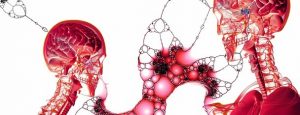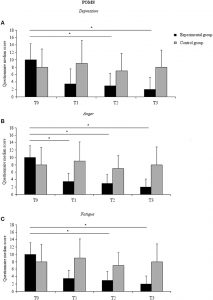Probiotics Boost Moods and Sleep – Bacteria in the Brain?
Probiotics can improve our moods and even improve sleep quality. Is this just a gut-brain axis issue or are there bacteria living in our brains?

Probiotics proven to better our moods and sleep. There is evidence that bacteria live in the brain.
The assumption of conventional medicine over the past century has been that the brain is basically sterile. Unless it is infected with bacteria or a virus – such as in bacterial or viral meningitis. But is this proven out completely?
Surely, scientists readily find many species of bacteria in dead brains. But the assumption of conventional medicine has been that the brain was exposed to these species after the patient died in those cases.
In this article
Is it the gut-brain axis?
Confusing the issue, as we have reported, has been increasing research connecting the use of internal probiotic supplements with less anxiety and depression. We also showed how probiotics can improve bipolar disorder. Now we are discovering that certain probiotic species actually improve moods and sleep.
Furthermore, we have documented evidence showing that Alzheimer’s disease is readily linked to gum diseases such as gingivitis. This evidence shows that bacteria are leaking into the bloodstream and infecting nerve and brain cells.
How could they do this if the brain was devoid of bacteria? And how can gut probiotics affect the brain so meaningfully from so far away? The assumption of the gut-brain axis – through the vagus nerve – has not truly been put to the test. Yes, there is evidence that the vagus nerve can be affected by bacteria. But how does that occur? Are bacteria talking to nerve cells?
There is certainly room for that either way. Truly, bacteria in the gut may well affect the vagus nerve through the production of certain chemicals that turn on or off nerve responses. But bacteria may also arrive in the brain as well, as we’ll discuss.
The problem, of course, is that we don’t have the equipment to trace living bacteria within a living body. We might have CT-scans and X-rays, but these do not image bacteria. Unless of course, the bacteria were somehow colored with a radioactive element. But that produces other potential problems.
Before we discuss this issue of brain bacteria in more depth, let’s review some recent research proving that probiotics affect our moods and sleep.
Probiotics affect moods, behavior and sleep
In a 2019 study, researchers from the University of Verona studied 38 healthy people over a four-month period. The researchers randomly divided the patients into two groups. One group was given a 4 billion CFU blend of probiotic bacteria for six weeks.
The probiotic species were:
• Lactobacillus fermentum
• Lactobacillus rhamnosus
• Lactobacillus plantarum
• Bifidobacterium longum
The other group was given a placebo supplement.
Before the study began, each of the subjects was assessed for mood behavior, sleep quality and personality issues. They were also assessed for anxiety, depression and anger. Then after three weeks, the subjects were all tested again for the same parameters. Then at the end of the six weeks, and three weeks after stopping the supplement, the subjects were all tested the same, comparing their scores with before the test.
The researchers found that the group taking the probiotics had significant mood improvements. They also had significantly reduced levels of depression, anger and fatigue.
The probiotics group also reported better sleep after taking the probiotics.
The tests that were given to each subject included:
• Leiden Index of Depression Sensitivity-Revised Test (LEIDS-R)
• State Trait Anxiety Inventory (STAI)
• Beck Depression Inventory (BDI)
• Profile of Mood State (POM)
• Pittsburgh Sleep Quality Index (PSQI)
To give you an example of the significant improvements found in the probiotic group, take a look at the charts for the profile of moods, the anger and the fatigue results. Even though the average scores of the probiotic group was higher than the placebo group in all three tests, after the test period they all showed significant improvement.

Study results showing how probiotics improve moods, and reduce anger and depression. The black is the probiotic group.
The study showed similarly significant results in the other tests, and for the sleep quality, the researchers concluded:
“More precisely, the experimental group participants reported that their sleep quality improved after 6 weeks of probiotics intake.”
As we’ve reported in my books on the topic, other studies have confirmed this aspect of probiotics helping improve our sleep.
But with regard to moods, anger and depression, just how does this work? Of course, the “gut-brain axis.” But what if bacteria also inhabit the brain?
Bacteria in the brain
In November of 2018, Dr. Rosalinda Roberts and fellow researchers at the University of Alabama in Birmingham disclosed their research findings that show clear evidence of healthy brains incubating probiotic bacteria.
Dr. Roberts is a professor of Psychiatry and the Director of the Alabama Brain Collection. She and her associate researchers published a study abstract at Neuroscience and discussed her findings during their annual meeting.
The study tested postpartum brain samples (those who recently died). These included both human brains and mice brains. Utilizing special electron microscopes, they found 34 cases where the healthy brains were hosting bacteria. They found substantial quantities of the mostly rod-shaped bacteria in the substantia nigra, hippocampus and prefrontal cortex.
Most probiotics are rod-shaped bacteria.
The scientists also found bacteria in other parts of brain tissues, including the striatum, and within intracellular tissues, dendrites, myelin axons and glial cells. Abundant numbers were found within the blood-brain barrier cells.
The researchers virtually eliminated the potential for contamination and noted that hosted brains did not show any signs of inflammation. This would be the case if the bacteria were damaging the brain.
The researchers reported:
“The observation that the location of the bacteria was highly specific and deep within the specimens also argues against contamination. Interestingly, there were no structural signs of inflammation in any of the brains examined. It is presently unclear the route of entry bacteria take to the brain, but the evidence of them in axons and at the blood brain barrier supports previous speculation.”
The previous speculation the researchers are identifying:
“It has been proposed that bacteria can enter the brain through the blood brain barrier, and/or via nerves that innervate the gut.”
The bottom line is there is clear evidence that probiotic bacteria can climb into nerve cells. This means there is the potential that bacteria actually travel through the vagus nerve from the gut to the brain this is evidenced by their finding bacteria within the nerve cells and myelin sheaths.
It is not so weird that our gut probiotics are affecting our moods, sleep and depression and anxiety if there are bacteria living in our nerves and brains. And it isn’t odd that Alzheimer’s is linked to bad oral bacteria either.
Scientific References:
Marotta A, Sarno E, Del Casale A, Pane M, Mogna L, Amoruso A, Felis GE, Fiorio M. Effects of Probiotics on Cognitive Reactivity, Mood, and Sleep Quality. Front Psychiatry. 2019 Mar 27;10:164. doi: 10.3389/fpsyt.2019.00164.
Roberts RC, Farmer CB, Walker CK. The human brain microbiome; there are bacteria in our brains. Neuroscience Nov. 2018. 594.08 / YY23















